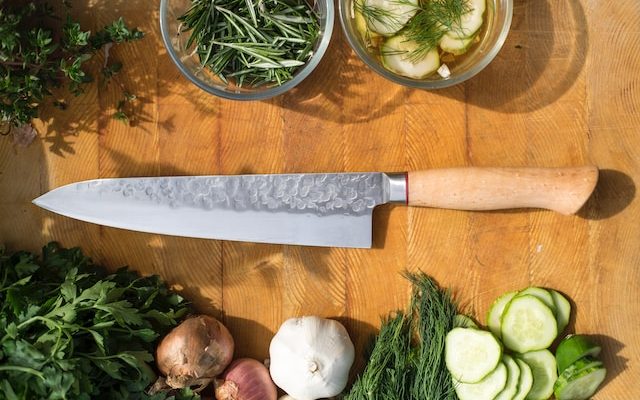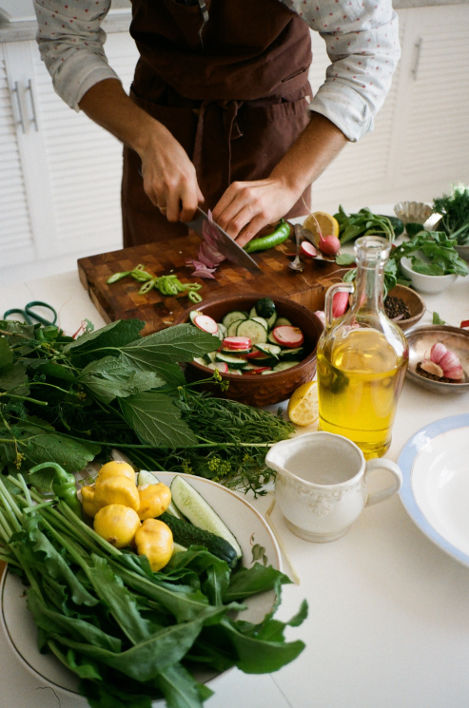Whether you’re only starting to find your way around the kitchen now or you’re a confident home cook who knows tons of decadent recipes and cooking techniques, it’s critical that you know how to properly care for and maintain your kitchen knives.
Quality kitchen knives, including exquisite Damascus kitchen knives, are an investment that can last a lifetime. However, without proper care and maintenance, even the highest quality blades won’t last long.
These care and maintenance tips will ensure you won’t ever need to replace your kitchen knife.
Use A Sharpening Tool
A knife sharpening stone, or a whetstone, is essential for anyone with quality kitchen knives. Whetstones are relatively easy to use, although you will need to develop a technique of holding the blade at the right angle and using the correct sharpening motion. You could also consider a honing rod, which is slightly easier to use.
When using a whetstone, you will need to wet the stone block and hold the knife blade at an angle before sliding it across the stone until sharp. The process is slightly more straightforward with a honing rod as you drag the blade over the honing rod a few times on each side.
Dull blades are not just frustrating to use; a blunt knife is dangerous. Nevertheless, you must sharpen your blades at least once a year. Even so, instead of waiting a whole year, you should inspect blades routinely and sharpen them when necessary.
Clean Knives After Each Use
One of the worst habits a home cook can make is wiping blades down to reuse them later instead of washing them properly. Foods and ingredients that are acidic, like lemons, tomatoes, and even onions, can corrode knife blades over time. So be sure to wash knives with soapy water directly after using them to prevent rust and corrosion.
Even if you are preparing a meal in a hurry, fill your sink with soapy water before you start cooking to make a habit of washing each knife as you work.
Dry Knives Immediately
Even though most modern stainless steel kitchen knives contain an alloy that wards off rust, neglecting knives will lead to small rust patterns developing over time. While it’s crucial to wash knives after using them, you must also dry each knife properly.
If you decide to let your knives air dry, you will risk gradual rust and germ build-up. So be sure to dry each knife with a clean hand towel.
Find The Right Cutting Boards
Not all cutting boards are the same; some are better than others, and a few should be avoided altogether. You might think that glass cutting boards are a charming, modern option. However, glass is one of the worst materials to choose. Instead, choose wood or plastic cutting boards that aren’t hard enough to dull blades.
Don’t Use The Dishwasher
Dishwashers are incredibly handy appliances that make keeping the kitchen clean a lot easier. There’s no need to wash each item individually or get your hands dirty. Simply pack up the dishwasher and press the start button.
However, certain utensils, cookware, and crockery are not dishwasher safe. While some plastic cups, bowls, and plates will melt in high heat, glass and porcelain will degrade and inevitably crack for the same reason.
That said, kitchen knives are one such item that must be hand-washed to prevent damage. When packing kitchen knives in the dishwasher compartment for cutlery and utensils, other cutlery will knock against the blades, dulling them and causing damage. At the same time, even high-quality stainless steel knives will eventually rust due to the lengthy drying function of dishwashers.
Store Knives Properly
If you have been tossing your knives into the drawer along with other cutlery, your knives won’t last long. Blades can endure damage when constantly in contact with other cutlery items.
Moreover, it’s also dangerous to reach into a drawer with exposed blades and fish for the correct item.
Instead, get a knife block or a magnetic knife storage strip. While a knife block can fit in well with any kitchen design and decor, a magnetic knife strip is the most space-saving solution. This kind of storage is great for kitchen organization. You could also consider plastic protective knife caps that make it possible to store knives in the drawer safely.
Don’t Cut Hard Foods Or Bones
Even the highest-quality kitchen knives are not made to cut through bones and extremely hard foods. Avoid using your chef’s knives to cut through bones unless you have a bone cleaver, butcher’s knife, or meat cleaver. At the same time, coconuts, pineapples, lobsters, crabs, hard squash, and some types of hard cheese should not be cut with chef’s knives, paring knives, or other standard kitchen knives.
Learn Proper Techniques
Using a kitchen knife wrong will wear down the blade and even ruin your meal. So, learning proper techniques to slice, dice, and chop foods is essential to avoid damaging your knives. While handling kitchen knives with care is necessary, try not to twist the knife when slicing and forcing it through food. Also, never use your knife to wipe food off the chopping board.
Replace Handles After A Few Years
A quality set of kitchen knives can last a lifetime. But the handles might not last as long. Whether the handles are made from wood, plastic, or another material, they won’t last as long. Instead of throwing out your knives and replacing them when you notice the handles degrading, you can replace them every few years.
Conclusion
Knife maintenance and care ensure your kitchen knives can last a lifetime. With this, you can invest in high-quality knives instead of frequently buying and replacing cheap blades. Nevertheless, looking into knife buyer guides to find blades that can last a lifetime is worthwhile. Even when visiting a speciality store, you must evaluate blade material, handle comfort, balance, and warranty. When buying online, read customer reviews to confirm that others recommend the product.


